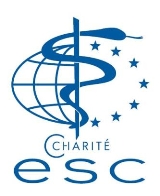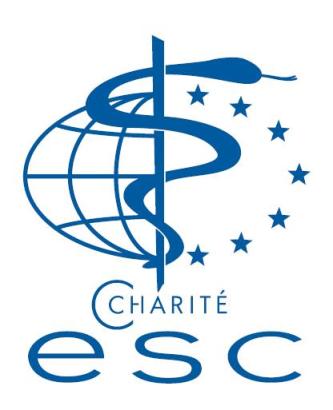
European Students Conference
Encyclopedia
| European Students' Conference | |
 |
|
| Location | |
| Founded | |
| Participants | |
| Prize money | |
| Official website | |
The European Students' Conference (ESC) is an international scientific conference held annually for a week in October http://www.esc-berlin.com http://youtube.com/watch?v=o5JQMZ0E0fM. Run by a team of mostly medical students, ESC is one of the largest student-run biomedical scientific conferences worldwide. It takes place at the Charité
Charité
The Charité - Universitätsmedizin Berlin is the medical school for both the Humboldt University and the Free University of Berlin. After the merger with their fourth campus in 2003, the Charité is one of the largest university hospitals in Europe....
Medical School in Berlin
Berlin
Berlin is the capital city of Germany and is one of the 16 states of Germany. With a population of 3.45 million people, Berlin is Germany's largest city. It is the second most populous city proper and the seventh most populous urban area in the European Union...
, Germany. From the 21st to the 24th September 2011 the conference will be held for the 22nd time and its theme is: "Perspectives and Challenges in Regenerative Medicine".
History
ESC has become one of the main scientific events at the CharitéCharité
The Charité - Universitätsmedizin Berlin is the medical school for both the Humboldt University and the Free University of Berlin. After the merger with their fourth campus in 2003, the Charité is one of the largest university hospitals in Europe....
Medical School. Founded in 1989, at the time of major political changes at the then most prestigious medical school of the German Democratic Republic
German Democratic Republic
The German Democratic Republic , informally called East Germany by West Germany and other countries, was a socialist state established in 1949 in the Soviet zone of occupied Germany, including East Berlin of the Allied-occupied capital city...
, it is today one of the largest and well-known conferences of its kind. From the onset, the idea behind the ESC was to foster a better relationship between East and West. German reunification in October 1990 created the opportunity to transfer knowledge and to create a closer relationship between medical faculties in East and West. The role of the ESC now is the support of young scientists and the advance of biomedical science on a more international scale.
-
- 22nd ESC http://www.esc-berlin.com: 21st - 24th Sep 2011
- 21st ESC: 14th - 17th Oct 2010
- 20th ESC: 4th Oct - 7th Oct 2009, kickoff for the 300 years celebration of Charite http://charite300.charite.de/
- 19th ESC: 29th Sep - 3rd Oct 2008
- 18th ESC: 7-11th Oct 2007: the German Diary was started http://www.esc-blog.de/
- 17th ESC: 8-12th Oct 2006
- 16th ESC: 19-23rd Oct 2005
- 15th ESC: 19-23rd Oct 2004
- 14th ESC: 4-8th Nov 2003
- 13th ESC: 29th Oct-2nd Nov 2002
- 12th ESC http://home.arcor.de/12thesc/: 21-25th Nov 2001
- 11th ESC: 22-26th Nov 2000
Topics
22nd European Students ConferenceThe topic of the 22nd European Students’ Conference in 2011 is “Perspectives and Challenges in Regenerative Medicine”. The objective of the conference is to present and discuss the newest developments and breakthroughs in this innovative medical field.
Researchers from all over the world are expected to present their current projects on tissue engineering and cell-reprogramming as well as their various potential applications in different clinical fields. In the last 6 years, the research landscape of regenerative therapies has undergone a huge change. The induction of embryonic stem cells from somatic cells has made it possible to avoid many ethical issues and pharmaceutical companies recognize the huge potential of this field, investing billions into projects which, one day, will provide ways to cure many of the chronic ailments that people suffer, like Parkinson’s disease or diabetes.
Objectives
The ESC is a platform for scientific exchange, as well as for the interaction of:- students of medicine and related disciplines
- young and experienced scientists
- newcomers and the public
- university and industry
- medical students and young scientists, who wish to explore the possibilities of working and researching in Germany.
Program
Emphasis is put on a high quality scientific and educational program. This is realized in scientific sessions, educational workshops and lectures that cover most fields of medicine. In addition to general subjects, each team selects a priority topic that becomes the focus of the respective ESC, e.g. cardiovascular research, regenerative medicine, neuroscience etc.Operative team
The ESC is run by an operative team of 5-8 students who are annually selected and appointed by the steering committee and the preceding operative team. Each of the new team members manages a part of the operational process, including project management, scientific coordination, finances, fundraising, public relations, program, logistics and information technology. The operative team receives knowledge support from the active ESC alumni and institutional support from the faculty of CharitéCharité
The Charité - Universitätsmedizin Berlin is the medical school for both the Humboldt University and the Free University of Berlin. After the merger with their fourth campus in 2003, the Charité is one of the largest university hospitals in Europe....
Medical School.
Alumni
As an ESC alumni, every member of previous operative teams is encouraged to support the operative team by their knowledge of the process of conducting ESC, and participate in "across-the-board" discussions regarding the ESC.Steering committee
The ESC steering committee is a group of ESC alumni. After at a least a year, every member of the ESC operational team can subsequently be appointed a member of the steering committee.The Steering Committee works to:
- select an operative team, and help its appointment by the dean and faculty of Charité
- promote transfer of knowledge between previous operative teams and the current team
- offer workshops to give an overview of organisation
- meet with the operative team to set out aims for the achievement of organisational goals
- suggest how to deal with troublesome situations/team members

